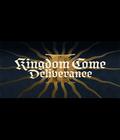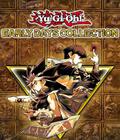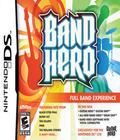Rhythm games have had a pretty good run on the portable systems. Games like DJ Fever Max and PaRappa The Rapper on the Sony PSP and Elite Beat Agents and Rhythm Heaven on the Nintendo DS have proven that a fun rhythm game can be played while on the go. Peripheral-based rhythm games, however, weren't really thought of as viable until Guitar Hero: On Tour for the Nintendo DS hit the scene a few years ago. Equipped with a guitar grip, the game did a pretty good job of replicating guitar playing and became a decent hit. With the launch of a new game in the Hero series on the home consoles, Activision decided that Nintendo's portable powerhouse should also participate in the new series. Band Hero for the DS was born, bringing with it some all-new features to go along with established ones. The result may not be perfect, but it's a fairly good start for a new franchise.
The overall premise of the game is the same as the ones before it. You pick a character or create one of your own to start the game. From here, you choose a song and venue and then play the song by hitting the colored notes as they pass over the designated hit area. Hitting them correctly nets you points and keeps you going, while missing them makes you lose favor with the audience. By the end of the song, you're given a star rating and cash payout based on how well you did.
Band Hero for the Nintendo DS has one advantage over its home console siblings in that it feels like a brand-new game series instead of a franchise splintering. This is all based on the introduction of two new game mechanics that haven't been previously existed in the portable version. Drums have been scaled down to use only four pads and are replicated via an overlay that covers the d-pad and face buttons. Singing is also a new mechanic, and players can actually sing into the DS' built-in microphone. The game still features guitar play and uses the same peripheral to accomplish this task, making veterans of the previous series feel right at home.
The single-player mode feels a bit too simple and unstructured. There are really two modes here, but the Fan Requests mode is simply a bridge to a feature in the Wii iteration of Band Hero. You take the data transmitted from the Wii version and complete the mini-games on the DS version. Doing so opens up new character creation items and characters for both versions once you send back the data. This is a great extra for owners of both systems and versions of the game, and while it felt like you weren't missing too much on the Wii version, it does feel like you're missing something on the DS version since there's not much else to do here.
Your main single-player mode consists of playing through songs and earning enough stars and cash to unlock more venues and character creation pieces. There are a few changes to the overall model that try to make the game feel different, though. The first is the inclusion of some mini-games to earn star power. At certain moments in the song, you can go into modes where you crowd surf, high-five the crowd or toss swag to them. Successfully completing them gives you an extra star power boost, while missing them does nothing. Either way, the song keeps playing, and you aren't penalized for missing those parts.
Another change is the inability to completely fail a song. Unlike other music games, you can get the fail message but still keep performing until the song ends and earn everything while doing it. It dampens the difficulty a bit since you know you don't have to stay consistently good at a song in order to gain something from it. Finally, there are even awards at the end of songs; you can earn bonus cash for doing things like earning five stars in a performance or nailing all star power sections. These awards make the single-player mode feel like it has substance, but without a true career mode to go through, it feels like you're playing just to practice on all of the available songs with the instrument of your choice.
The multiplayer modes emulate the core of what made the home console version popular. The co-op mode lets you form a band of four players locally to play any song in the game. You can form the band out of any combination of instruments (bass, drums, guitar, vocals) and are each given a score based on how well you performed that instrument on the song. The issue here is that it has the same problem as the single-player game: There is no structured multiplayer career mode here either. You simply play songs together, and while that's fun, there isn't much incentive to do so.
The versus mode lets you and a friend compete on the same instrument using the same song for the highest possible score. The mode is straightforward enough and a better way to get versus play for both drummers and singers, since it's easier to do so here than on the home console version. It is a bit disappointing, though, to see guitar and bass players get the shaft this time around. Guitar Hero: On Tour let owners of different versions temporarily download the other's song list, creating a massive list of songs to compete against. Sadly, because of the desire to create a new brand, that feature has been omitted here. Guitar and bass players can still play a versus game with other Band Hero players, but don't expect to play against Guitar Hero: On Tour players in the process.
This type of game can thrive or falter on controls alone, and it's here that the game is in a state of flux. Guitar and bass players get the same guitar grip as before, and the mechanics remain unchanged. Smaller hands will be fine with the setup, but larger ones will feel cramped after playing through a few songs. Singing into the microphone can be a bit cumbersome since it seems to pick up high- and mid-range pitches, but not low pitches. A mic sensitivity feature would have helped alleviate this issue because without one, players have to put the mic close to their faces in order to have it pick up pitches correctly. This will be fine for those who know the pitch and lyrics for the song, but for those who don't, the singing can give you headaches after extended play since the screen will be too close for you to focus on.
Drumming is fine for the most part. Hitting the drum overlay feels responsive and can make things easier for some, thanks to its reliance on button presses more than anything else. What needs some adjustment, however, is the display for the drum controls. On the screen, the colors are laid out in a straight line. On the system, the colors are laid out diagonally. It will take some adjustment to get used to the layout translation on-screen, but things become fine once you get used to it.
The graphics haven't really changed from the move between Guitar Hero and Band Hero. The venues look as good as one can expect from a 3-D environment on the DS. It may be low-resolution, but it does come with some good particle and smoke effects. The characters all retain a cartoonish look to them, which matches the game motif well. Unfortunately, they don't move too well. There are times when their animations skip frames, giving them a jerky look when they are introduced and a few times as they're playing their respective instruments. The note highway isn't plagued by these animation hiccups and moves rather smoothly, so it's a bit disconcerting to see the character animation need some improvement.
The sound is rather good and continues to show how powerful the system can be in this category. The effects are fine, but the real focus was on the songs. There are 30 included songs here, and each one sounds like radio reproductions of the song. They're clear enough to be understood on the standard DS speakers but really come to life when using headphones. The censorship issue from the home console version is still here, but at least it doesn't feel too inconsistent, thanks to the better song selection used here.
Band Hero works well enough on the DS. The core gameplay is good, and the song list is diverse enough that you can play this for a good amount of time before becoming bored. The controls need some work — namely the display for the drums and microphone sensitivity — but the guitar remains unchanged for those who are already fine with it. Fans of the Guitar Hero: On Tour franchise will have already picked up this titles, and those who haven't will find a fine game to rock out with on the go. All others who haven't tried the series but are curious about the game may want to rent it first to see if the controls will push you toward a purchase or send you running to the console versions instead.
Score: 7.0/10
More articles about Band Hero












 With Band Hero, you can come together with family and friends to ascend the virtual stage and rise to fame, bringing you a new genre of music focused on today's hottest top-40 hits and classic anthems that everyone will know.
With Band Hero, you can come together with family and friends to ascend the virtual stage and rise to fame, bringing you a new genre of music focused on today's hottest top-40 hits and classic anthems that everyone will know.











